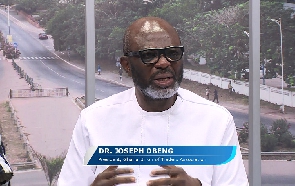- Home - News
- TWI News | TV
- Polls
- Year In Review
- News Archive
- Crime & Punishment
- Politics
- Regional
- Editorial
- Health
- Ghanaians Abroad
- Tabloid
- Africa
- Religion
- Election 2020
- Coronavirus
- News Videos | TV
- Photo Archives
- News Headlines
- Press Release
General News of Sunday, 11 March 2007
Source: Daily Telegraph
Red Face Day for Ghana?

Wearing a red nose for Africa's corrupt clowns is a bad joke
Next Friday is Red Nose Day in Britain. Perhaps it should also be Red Face Day in Ghana. Let me explain why.
Comic Relief, the entity behind next Friday's antics, has as its stated aim the creation of "a just world free from poverty". To this end, it has raised a total of more than £425 million since coming into existence in 1985 - just under £20 million a year. Some of this money has been spent to reduce poverty in Britain. But, according to its website, Comic Relief has also made "over 1,700 grants internationally" to a variety of non-governmental organisations to mitigate the sufferings of street children, AIDS sufferers, oppressed women, victims of conflict and slum-dwellers.
Currently, Comic Relief is funding four projects in Ghana, to the tune of £1.7 million: a "Women's Development Agency", an "African Women's Support Group", an entity called "Hope for Children" and another calling itself "African Outreach". If you are the kind of person who likes to don a plastic red nose once a year, you may wish to think of these (doubtless worthy) recipients as you make yourself look like a clown this Friday.
Red Face Day, meanwhile, was last Monday. That was the day that Ghana began a planned 12-month celebration of its independence from British rule, which was granted 50 years ago, on March 5 1957. The total budget for these festivities, which commenced with an all-night party in Accra, is said to be £10.4 million.
You might reasonably ask if this is a sensible way of spending $20 million dollars at a time when the average citizen of Ghana has a daily income of around 67p ($1.33). You might also ask what exactly Ghana has got to celebrate after 50 years of "freedom".
Let us not pretend that the Gold Coast, as the country was known before independence, was a flourishing economy. Heavily reliant on the export of cocoa, with scarcely any manufacturing industry, it was highly vulnerable to fluctuations in world commodity prices. The average Briton was 39 times richer than the colony's average inhabitant. On the other hand, the Gold Coast was regarded as one of the most advanced of Britain's African possessions, which was one reason it was the first to be granted independence. Three years before independence, thanks in large measure to the efforts of missionary schools, Africans already occupied a third of senior civil service posts.
Yet the economic consequences of independence gave the lie to the old Leftist claim that Britain was exploiting her colonies. Between 1960 and today, the gap between Britain and Ghana has more than doubled, so that the average Briton is now 92 times richer than the average Ghanaian.
Today, according to the World Bank, aid accounts for 16 per cent of Ghana's national income and covers fully 73 per cent of government expenditure. (I am sure the donors were delighted to hear that $20 million of this year's handout was being blown on a year-long party.) In short, it has been but a short step from independence to aid-dependence.
So what went wrong? The answer is more or less the same answer you would give for any sub-Saharan African country since 1957. Kwame Nkrumah, who led Ghana to independence, was in many ways typical of the first generation of post-colonial African leaders. The product of a Catholic mission school and an American university (he was turned down by the University of London because of weak Maths and Latin), Nkrumah was wholly incapable of distinguishing the virtues from the vices of British rule.
Though it was tightfisted when it came to education and healthcare, the Colonial Office at least provided the foundations for economic and political stability: trade, balanced budgets, sound money, the rule of law and non-corrupt administration. Nkrumah lost little time in ditching all of these things.
If you look at the photographs of the handover of power in 1957, the Duchess of Kent looks pained; the Governor, Sir Charles Arden-Clarke, looks sceptical. Those facial expressions proved eminently justified.
Five year before, one British official had warned: "It seems fairly clear that the danger\u2026 now is not that of an outburst of anti-European\u2026 feeling but rather that of an abuse by a certain section of Africans of the power which we are transferring to them. This danger arises partly out of the tendency of the African to exploit the African if placed in a position to do so, and partly out of the lessons in the organisation of party dictatorship which some of the\u2026 leaders learnt from their early flirtation with Communism\u2026"
Too true. As soon as he had been brought into government after the country's first general election in 1951, Nkrumah had increased government expenditure by a factor of ten and expanded the senior civil service by a factor of five. It was a classic case of jobs for the boys, as members of Nkrumah's Convention Peoples' Party hit the political equivalent of the jackpot. "The Government is in the hands of knaves," lamented one departing British official. Too late. Ghana provided the first of many examples of African democracy in action: one man, one vote - once.
The government was also in the hands of dupes. A long-standing Communist Party member, Nkrumah was easily persuaded by the KGB that the CIA was plotting against him, and readily acceded to Soviet offers of assistance.
This took the form of a KGB-trained National Security Service with a huge network of paid informers and over a thousand Russian "advisers". By the early 1960s Ghanaian women were staging protests with placards reading "BRING BACK THE BRITISH".
Harold Wilson's government had other concerns, however. It was left to the Ghanaian army to overthrow Nkrumah in 1966 (while he was visiting Ho Chi Minh in North Vietnam). Far from improving matters, this proved to be the first of umpteen coups, culminating in the bloody seizure of power by Flight Lieutenant Jerry Rawlings in 1981. Although Rawlings formally
restored democracy in 1992, he remained in power until 2001 and his party, the National Democratic Congress, continues to rule the country.
Today, there are still people who fondly believe that all Africa's problems are a legacy of colonialism - the fault of the wicked British. Those same people also cling to the notion that this legacy can be expunged only by the payment of reparations in the name of "aid". Fifty years on we can surely think more clearly. In virtually every case (Botswana is the sole exception), former British colonies in sub-Saharan Africa have fared worse under independence than they did under British rule. In virtually every case, as New York University's William Easterly has pointed out, the expenditure of billions in Western aid has failed to raise their rate of economic growth.
In his forthcoming book, The Bottom Billion, the Oxford economist Paul Collier brilliantly anatomises the true causes of Africa's post-colonial failure. He identifies four traps into which a depressingly large number of sub-Saharan countries have fallen since the 1950s. Some are trapped by their dependence on natural resources like diamonds or oil, some by being landlocked and some by recurrent civil war. But the fourth trap is the one that applies to Ghana: the trap of bad governance.
To illustrate the folly of giving aid to chronically misruled countries, Collier cites a recent survey that tracked money released by Chad's Ministry of Finance to fund rural health clinics. Just 1 per cent reached its intended destination. The rest was raked off by one corrupt official after another.
So forgive me if I don't wear a red nose on Friday. I simply have no desire to join the Africa-saving circus currently run by NGOs, aid agencies and Irish rock stars.
As Easterly and Collier have shown, there certainly are ways to end poverty in a country like Ghana (not least a crackdown on corruption). But acting the clown while Ghana parties? Tell me another.










